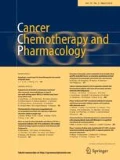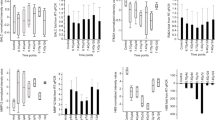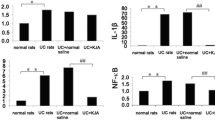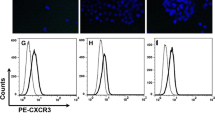Abstract
Purpose
The aetiology of mucositis is complex involving change in gene expression, altered apoptosis and interaction between epithelial and subepithelial compartments. This is the first investigation using microarray to assess chemotherapy-induced changes in the gut. The aims of this study were to identify genes that are altered by irinotecan, to determine how these genes contribute to apoptosis and to identify any potential gene families and pathways that are important for mucositis development.
Methods
Tumour-bearing female dark Agouti rats were administered twice with 150 mg/kg of irinotecan and killed 6 h after the final dose. Jejunal tissue was harvested and RNA was isolated. cDNA was synthesised and purified, prior to hybridisation and microarray analysis. A 5-K oligo clone set was used to investigate gene expression. Results from the microarray were quantified using RT-PCR.
Results
Many genes were significantly up- or down-regulated by irinotecan. In particular, multiple genes implicated in the mitogen-activated protein kinase (MAPK) signalling pathway were differentially regulated following treatment. These included interleukin 1 receptor, caspases, protein kinase C and dual-specificity phosphatase 6. RT-PCR was used to confirm effects of irinotecan on caspase-1 expression in jejunal tissue and was significantly increased 6 h after treatment with irinotecan.
Conclusions
This study has identified MAP kinase signalling as being involved with irinotecan-induced intestinal damage and confirms previous findings with radiation-induced oral mucosal damage, which also implicated this pathway. Microarrays are emerging as a valuable tool in mucositis research by linking such findings. The common pathway of chemotherapy- and radiotherapy-induced damage, which utilises the caspase-cascade, may be a useful target to prevent apoptosis following cancer treatment.


Similar content being viewed by others
References
Alimonti A, Gelibter A, Pavese I, Satta F, Cognetti F, Ferretti G et al (2004) New approaches to prevent intestinal toxicity of irinotecan-based regimens. Cancer Treat Rev 30(6):555–562
Altmann SW, Davis HR Jr, Zhu LJ, Yao X, Hoos LM, Tetzloff G et al (2004) Niemann-Pick C1 Like 1 protein is critical for intestinal cholesterol absorption. Science 303(5661): 1201–1204
Ando Y, Hasegawa Y (2005) Clinical pharmacogenetics of irinotecan (CPT-11). Drug Metab Rev 37(3):565–574
Barisani D, Parafioriti A, Bardella MT, Zoller H, Conte D, Armiraglio E et al (2004) Adaptive changes of duodenal iron transport proteins in celiac disease. Physiol Genomics 17(3):316–325
Boushey RP, Yusta B, Drucker DJ (2001) Glucagon-like peptide (GLP)-2 reduces chemotherapy-associated mortality and enhances cell survival in cells expressing a transfected GLP-2 receptor. Cancer Res 61(2):687–693
Bowen JM, Gibson RJ, Keefe DM, Cummins AG (2005) Cytotoxic chemotherapy upregulate pro-apoptotic Bax and Bak in the small intestine of rats and humans. Pathology 37(1):56–62
Bruno ME, Kaetzel CS (2005) Long-term exposure of the HT-29 human intestinal epithelial cell line to TNF causes sustained up-regulation of the polymeric Ig receptor and proinflammatory genes through transcriptional and post-transcriptional mechanisms. J Immunol 174(11):7278–7284
Cairo G, Pietrangelo A (1995) Nitric oxide-mediated activation of iron-regulatory protein controls hepatic iron metabolism during acute inflammation. Eur J Biochem 232(2):358–363
Cao S, Black JD, Troutt AB, Rustum YM (1998) Interleukin 15 offers selective protection from irinotecan-induced intestinal toxicity in a preclinical animal model. Cancer Res 58(15): 3270–3274
Chu QS, Hammond LA, Schwartz G, Ochoa L, Rha SY, Denis L et al (2004) Phase I and pharmacokinetic study of the oral fluoropyrimidine S-1 on a once-daily-for-28-day schedule in patients with advanced malignancies. Clin Cancer Res 10(15):4913–4921
Creagh EM, Conroy H, Martin SJ (2003) Caspase activation pathways in apoptosis and immunity. Immunol Rev 193:10–21
Gibson RJ, Bowen JM, Inglis MR, Cummins AG, Keefe DM (2003) Irinotecan causes severe small intestinal damage, as well as colonic damage, in the rat with implanted breast cancer. J Gastroenterol Hepatol 18(9):1095–1100
Gibson RJ, Bowen JM, Keefe DM (2005) Palifermin reduces diarrhea and increases survival following irinotecan treatment in tumor-bearing DA rats. Int J Cancer 116(3):464–470
Gibson RJ, Keefe DM, Clarke JM, Regester GO, Thompson FM, Goland GJ et al (2002) The effect of keratinocyte growth factor on tumour growth and small intestinal mucositis after chemotherapy in the rat with breast cancer. Cancer Chemother Pharmacol 50(1):53–58
Gibson RJ, Keefe DM, Thompson FM, Clarke JM, Goland GJ, Cummins AG (2002) Effect of interleukin-11 on ameliorating intestinal damage after methotrexate treatment of breast cancer in rats. Digestive Dis Sci 47(12): 2751–2757
Grutter MG (2000) Caspases: key players in programmed cell death. Curr Opin Struct Biol 10(6):649–655
Ikuno N, Soda H, Watanabe M, Oka M (1995) Irinotecan (CPT-11) and characteristic mucosal changes in the mouse ileum and cecum. J Natl Cancer Inst 87(24):1876–1883
Jarry A, Vallette G, Cassagnau E, Moreau A, Bou-Hanna C, Lemarre P et al (1999) Interleukin 1 and interleukin 1 beta converting enzyme (caspase 1) expression in the human colonic epithelial barrier. Caspase 1 downregulation in colon cancer. Gut 45(2):246–251
Johnson MR, Hageboutros A, Wang K, High L, Smith JB, Diasio RB (1999) Life-threatening toxicity in a dihydropyrimidine dehydrogenase-deficient patient after treatment with topical 5-fluorouracil. Clin Cancer Res 5(8):2006–2011
Katona C, Kralovanszky J, Rosta A, Pandi E, Fonyad G, Toth K, et al. (1998) Putative role of dihydropyrimidine dehydrogenase in the toxic side effect of 5-fluorouracil in colorectal cancer patients. Oncology 55(5):468–474
Keefe DM (2004) Gastrointestinal mucositis: a new biological model. Support Care Cancer 12(1):6–9
Keefe DM, Brealey J, Goland GJ, Cummins AG (2000) Chemotherapy for cancer causes apoptosis that precedes hypoplasia in crypts of the small intestine in humans. Gut 47(5):632–637
Keefe DM, Gibson RJ, Hauer-Jensen M (2004) Gastrointestinal mucositis. Semin Oncol Nurs 20(1):38–47
Kondo S, Barna BP, Morimura T, Takeuchi J, Yuan J, Akbasak A et al (1995) Interleukin-1 beta-converting enzyme mediates cisplatin-induced apoptosis in malignant glioma cells. Cancer Res 55(24):6166–6171
Lamkanfi M, Kalai M, Saelens X, Declercq W, Vandenabeele P (2004) Caspase-1 activates nuclear factor of the kappa-enhancer in B cells independently of its enzymatic activity. J Biol Chem 279(23):24785–24793
Launay S, Hermine O, Fontenay M, Kroemer G, Solary E, Garrido C (2005) Vital functions for lethal caspases. Oncogene 24(33):5137–5148
Lavrik IN, Golks A, Krammer PH (2005) Caspases: pharmacological manipulation of cell death. J Clin Invest 115(10):2665–2672
Lonnstedt I, Britton T (2005) Hierarchical Bayes models for cDNA microarray gene expression. Biostatistics 6(2):279–291
Lönnstedt I, Speed TP (2002) Replicated microarray data. Statistica Sinica 12:31–46
Marshman E, Ottewell PD, Potten CS, Watson AJ (2001) Caspase activation during spontaneous and radiation-induced apoptosis in the murine intestine. J Pathol 195(3):285–292
Martinon F, Tschopp J (2004) Inflammatory caspases: linking an intracellular innate immune system to autoinflammatory diseases. Cell 117(5):561–574
Morelli D, Menard S, Colnaghi MI, Balsari A (1996) Oral administration of anti-doxorubicin monoclonal antibody prevents chemotherapy-induced gastrointestinal toxicity in mice. Cancer Res 56(9):2082–2085
Morvan FO, Baroukh B, Ledoux D, Caruelle JP, Barritault D, Godeau G et al (2004) An engineered biopolymer prevents mucositis induced by 5-fluorouracil in hamsters. Am J Pathol 164(2):739–746
Mulder TP, van der Sluys Veer A, Verspaget HW, Griffioen G, Pena AS, Janssens AR et al (1994) Effect of oral zinc supplementation on metallothionein and superoxide dismutase concentrations in patients with inflammatory bowel disease. J Gastroenterol Hepatol 9(5):472–477
Philchenkov A (2004) Caspases: potential targets for regulating cell death. J Cell Mol Med 8(4):432–444
Pico J, Avila-Garavito A, Naccache P (1998) Mucositis: its occurrence, consequences and treatment in the oncology setting. Oncologist 3:446–451
Russo A, Corsale S, Cammareri P, Agnese V, Cascio S, Di Fede G et al (2005) Pharmacogenomics in colorectal carcinomas: future perspectives in personalized therapy. J Cell Physiol 204(3):742–749
Scheinin T, Bohling T, Halme L, Kontiainen S, Bjorge L, Meri S (1999) Decreased expression of protectin (CD59) in gut epithelium in ulcerative colitis and Crohn’s disease. Hum Pathol 30(12):1427–1430
Schreiber S, MacDermott RP, Raedler A, Pinnau R, Bertovich MJ, Nash GS (1991) Increased activation of isolated intestinal lamina propria mononuclear cells in inflammatory bowel disease. Gastroenterology 101(4):1020–1030
Shibata Y, Takiguchi H, Tamura K, Yamanaka K, Tezuka M, Abiko Y (1996) Stimulation of interleukin-1 beta-converting enzyme activity during growth inhibition by CPT-11 in the human myeloid leukemia cell line K562. Biochem Mol Med 57(1):25–30
Smyth GK (2004) Linear models and empirical Bayes methods for assessing differential expression in microarray experiments. Statist Appl Genet Mol Biol 3(1):2004
Sonis ST (2004) A biological approach to mucositis. J Support Oncol 2(1):21–32; discussion 35–36
Sonis ST (2004) The pathobiology of mucositis. Nat Rev Cancer 4(4):277–284
Sonis ST (2004) Pathobiology of mucositis. Semin Oncol Nurs 20(1):11–15
Sonis ST, Elting LS, Keefe D, Peterson DE, Schubert M, Hauer-Jensen M et al (2004) Perspectives on cancer therapy-induced mucosal injury: pathogenesis, measurement, epidemiology, and consequences for patients. Cancer 100(9 suppl):1995–2025
Sonis ST, Scherer J, Phelan S, Lucey CA, Barron JE, O’Donnell KE et al (2002) The gene expression sequence of radiated mucosa in an animal mucositis model. Cell Prolif 35(suppl 1):93–102
Takasuna K, Hagiwara T, Hirohashi M, Kato M, Nomura M, Nagai E et al (1996) Involvement of beta-glucuronidase in intestinal microflora in the intestinal toxicity of the antitumor camptothecin derivative irinotecan hydrochloride (CPT-11) in rats. Cancer Res 56(16):3752–3757
Tran CD, Howarth GS, Coyle P, Philcox JC, Rofe AM, Butler RN (2003) Dietary supplementation with zinc and a growth factor extract derived from bovine cheese whey improves methotrexate-damaged rat intestine. Am J Clin Nutr 77(5):1296–1303
Vakeva A, Laurila P, Meri S (1992) Loss of expression of protectin (CD59) is associated with complement membrane attack complex deposition in myocardial infarction. Lab Invest 67(5):608–616
Yang YH, Buckley MJ, Speed TP (2001) Analysis of cDNA microarray images. Brief Bioinform 2(4):341–349
Yu J, Shannon WD, Watson MA, McLeod HL (2005) Gene expression profiling of the irinotecan pathway in colorectal cancer. Clin Cancer Res 11(5):2053–2062
Acknowledgments
The authors wish to acknowledge Dr Ashley Connelly and the Adelaide Microarray Facility for assistance with this project, and Pfizer for the supply of the irinotecan. J. Bowen was supported by a Dawes Research Fellowship (Royal Adelaide Hospital) for the duration of this study.
Author information
Authors and Affiliations
Corresponding author
Rights and permissions
About this article
Cite this article
Bowen, J.M., Gibson, R.J., Cummins, A.G. et al. Irinotecan changes gene expression in the small intestine of the rat with breast cancer. Cancer Chemother Pharmacol 59, 337–348 (2007). https://doi.org/10.1007/s00280-006-0275-9
Received:
Accepted:
Published:
Issue Date:
DOI: https://doi.org/10.1007/s00280-006-0275-9




